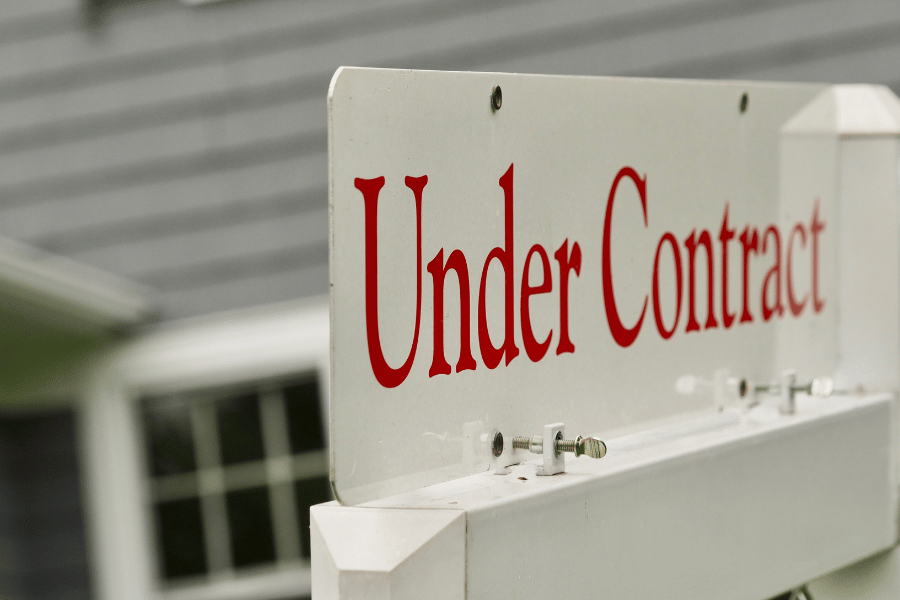How To Make an Offer On a House in 5 Simple Steps
May 24th, 2024

How To Make an Offer On a House in 5 Simple Steps
Are you considering making an offer on a home? Here is everything are five simple steps when making an offer on a house.
Buying a new home is one of the most exciting and important investments of your life. However, there is much to think about, as the home-buying process can be extensive. Whether you are a first-time home buyer or a seasoned pro, making an offer on a house can be difficult for anyone.
Some homebuyers are extremely quick to make offers, and others are slow. Making an offer on a home includes strategizing how much to offer, what contingencies you want, and how much earnest money to deposit. Then you can make your offer via letter and negotiate.
Placing an offer on a home involves several steps before and after. Finding the perfect home is hard enough, and it can be devastating if you don't get your dream home after making a bad offer.
Working with a real estate agent will help set you up for home-buying success. Before putting in an offer on the home, your real estate agent will conduct thorough research on comparable homes to ensure you are getting the best deal. You can buy a home without a realtor; however, they will be extremely helpful throughout the entire process.
Keep reading to learn all about how to make an offer on a house.
Chapters
1. Decide How Much To Offer
The first step of making an offer on a house is deciding how much to offer. It is important to stay within your budget but think about it carefully. Your real estate agent will be very helpful in this step.
You and your real estate agent should consider the amount of time the home has been on the market. If a home has been on the market for a while, then you may be able to buy the home for a lower price. This goes hand in hand with the current market conditions. If it is a buyer's market, meaning there are more homes available than buyers, then you could possibly buy the home for a better price.
Spend time researching comparable properties nearby that are for sale. This will give you a better idea of how much homes in the area go for. Your real estate agent will complete a comparative market analysis, which considers the most recent sales in the area.
For example, if the home you wish to purchase is listed for $250,000, but most of the homes in the area that are similar in size recently sold for $220,000, you will probably want to put in an offer closer to $220,000. Alternatively, if most of the homes sold closer to $275,000, you will know you are getting a good deal by offering at the asking price of $250,000.
According to the National Association of Realtors, recent sellers sold their homes for 100% of the listing price, and 32% reported reducing the asking price at least once.
Similar to this, you should consider your competition. Bidding wars may seem intimidating, but if you want the home, you should be aware of how much others are offering for it.

2. State Your Contingencies
Your contingencies are essentially escape clauses in a sales contract that would allow you to walk away from the sale with your earnest money. The earnest money is a type of security deposit. The most common contingencies include home inspection, appraisal, financing, and the title.
Let's say you include a home inspection contingency; this will state that if the home inspection reveals more problems with the home, then you are free to walk away without losing your earnest money.
Your contingencies are meant to protect the home buyer. However, a contingent offer can cause problems in a seller's market. If you include many contingencies on a popular home, you may end up losing the home because your competition may have fewer contingencies.
If you are buying a home in cash, you will not need to include a financing or appraisal contingency. Lenders only require these to ensure that the property is worth at least the mortgage amount.

3. Decide How Much Earnest Money To Offer
Earnest money is a deposit that protects the seller if the contract falls through. Typically, it is 1% to %3 of the home price. The buyer will deposit earnest money into an escrow account during the purchase process. After, if the buyer goes through with the purchase, this money will go towards the down payment or closing costs.
If you are buying a home in a seller's market, it can help to offer a higher deposit than average. This will show the homeowners how serious you are about the home and have the money to afford the home.
Once you and the seller start the purchase process, the home will be taken off the market. If the deal falls through before closing, the seller will have to put the home back on the market, which can result in a large financial hit. The earnest money will protect the seller if the buyer backs out or the purchase falls through.
While the average is 1% to 3% of the sale price, the exact amount of earnest money may vary depending on the current market conditions. If the deal falls through due to a failed home inspection or a listed contingency, the buyer will get their earnest money back.
Earnest money is not required to make an offer on a house. However, it may be necessary in a competitive real estate market. It will also lower the money you need during closing if it is used towards the down payment or closing costs. In other words, you are putting up some of the money earlier in the home-buying process.

4. Write A House Offer Letter
After deciding on how much money to offer, you will need to contact the seller. If you have a real estate agent, they will write the house offer letter for you. Otherwise, it will be up to you to write the letter.
If you are writing the house offer letter on your own, here are a couple of things to include:
- The address of the home you wish to buy.
- Your full name and the name of anyone who will be on the house title.
- The amount of money you want to offer.
- All contingencies the home needs for the sale to go through.
- Concessions you are asking the seller to pay for, for example, covering repairs.
- Items you wish to be included in the sale, such as appliances.
- The amount of earned money.
- Your mortgage approval letter.
- The date you believe you will close on your loan.
- Your expected move-in date.
- The deadline to respond to your offer.
While you don't need a real estate agent to make an offer on a house, they will be able to help you write your offer. This will increase the likelihood of getting the home. In addition to this information, you can include reasons why the home stands out to you. This may ensure the sellers remember you and increase your chances of getting your dream home.

5. Negotiate The Price and Terms Of The Sale
After sending in a house offer letter, the ball is in the seller's court. The seller can choose to do one of three things once they receive your offer. It is important to know what to do in each instance.
The Seller Accepts Your Offer
If the seller accepts your offer, you can start producing the earnest money check and sign the sales contract. You can move forward with your mortgage lender and schedule the home inspection and appraisal visits. If all goes well, the home will soon be yours.
The Seller Makes A Counteroffer
The seller may respond to your letter with a counteroffer; in this case, it'll be up to you on what to do next. Your real estate agent can contact the seller or their agent to gain more insight into what the seller wants.
You may be able to negotiate the price and terms of the agreement. These negotiations are typically informal and are simply conversations between the two parties. Keep in mind that you can negotiate more than just the price. You will need to find where the sellers' pain points are, such as the need to close quickly. This will give you the upper hand in negotiations and hopefully save you time and money.
The Seller Rejects Your Offer
The seller can reject your offer for several reasons. Although it may be disappointing, remember the right home is out there. A seller can reject your offer because they don't think you offered enough money, they aren't ready to sell, went with another buyer, or any other reason.
The entire process is a learning experience, if you don't get the home you want now, at least you'll know more for next time.

Methodology
We used information and data from several different sources, as well as our own data, to determine everything you need to know about making an offer on the house. Most of the data was sourced from the following sources:
FAQ: How To Make an Offer On a House
Here are some commonly asked questions about how to make an offer on a home.
What is the rule of thumb for making an offer on a house?
The rule of thumb is typically between 5 and 10 percent of the home price. Keep in mind that you could lose your money if the deal falls through, so be careful during the process.
What four steps are required to form an offer?
When making an official offer on a home, you need to figure out the amount of your official offer, draw up the purchase offer paperwork, negotiate the terms of your agreement, and provide the deposit for the new home.
What contingencies should be put in an offer?
You can technically add any contingencies you want, but the most common ones include a home inspection contingency, appraisal contingency, clear title contingency, and home insurance contingency.
What should you do before making an offer on a house?
Before making an offer on a house, it is important to get pre-approved for a mortgage, have your cash ready, create a budget, and do another walk through the home.
How to write a house offer?
If you plan on writing a house offer, you should address the seller and introduce yourself. Let them know why the home stands out to you and even find something in common with the homeowner. After this, you can present your offer, including any contingencies.
How To Make an Offer On a House - The Bottom Line
Before you start looking for your next home, make sure you are knowledgeable and comfortable with the process. Making an offer on a home can be what stands between you and your dream home, so ensure you are prepared.
Remember that even after making an offer, you are free to change your mind and walk away before signing a contract. You will be the one paying for and living in the home; you need to be completely comfortable with the terms of the purchase.
The Triangle is full of many homes where amenities and local favorites will surround your family. Whether you are searching for a single-family home, townhome, condominium, or apartment complex, you are bound to find the best home in Raleigh for you and your family.
Before you buy your next home in the Triangle, feel free to contact one of our helpful real estate specialists, as they are eager to help you find the perfect home. They will be taking charge during the negotiation process to guarantee you get the best bang for your buck. We know that buying a home can be overwhelming, so make sure you are prepared beforehand.

Ryan Fitzgerald
Hi there! Nice to 'meet' you and thanks for visiting our Raleigh Real Estate Blog! My name is Ryan Fitzgerald, and I'm a REALTOR® in Raleigh-Durham, NC, the owner of Raleigh Realty. I work alongside some of the best Realtors in Raleigh. You can find more of my real estate content on Forbes, Wall Street Journal, U.S. News and more. Realtor Magazine named me a top 30 under 30 Realtor in the country (it was a long time ago haha). Any way, that's enough about me. I'd love to learn more about you if you'd like to connect with me on Facebook and Instagram or connect with our team at Raleigh Realty. Looking forward to connecting!
Related Blogs





